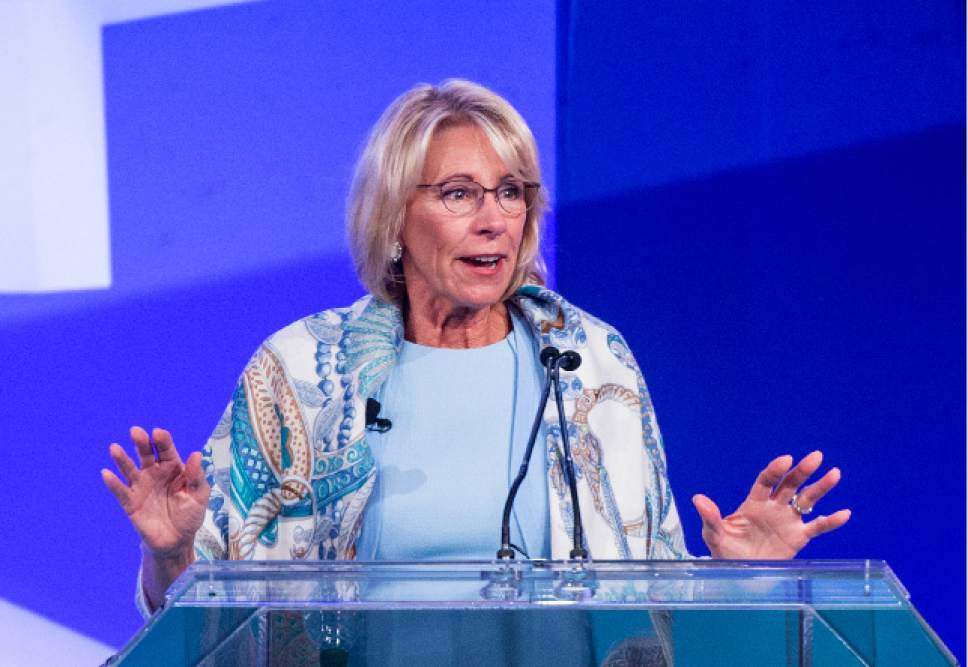This is an archived article that was published on sltrib.com in 2017, and information in the article may be outdated. It is provided only for personal research purposes and may not be reprinted.
Emboldened by the new White House administration, the money man behind Utah's ambitious voucher proposal that was crushed by voters a decade ago says there is a renewed appetite to expand school choice in the state.
Overstock founder Patrick Byrne said the school vouchers movement has been rekindled in his home state now that his longtime acquaintance and fellow school vouchers advocate Betsy DeVos has been appointed education secretary by President Donald Trump.
DeVos was in Utah on Tuesday at an annual education technology conference, where she compared school choice to being able to switch between phone service providers.
"There's all kinds of things I disagree with from the Trump administration, but I love that they appointed Betsy," Byrne said in an interview with The Associated Press. "The time to strike is when the iron is hot, and the iron is hot right now."
In 2007, Utah lawmakers created what would have been the nation's first statewide school voucher program. But opponents led by the Utah Education Association gathered enough signatures to take it to a referendum to repeal the bill.
The teachers union was armed with millions of dollars for the effort. Yet it was still considered an uphill battle given that the Byrne family alone contributed more than $4 million to ensure vouchers would be available to any student's family who wanted to take their tax dollars to a private school.
On Election Day, 62 percent of the voters spoke out against vouchers.
And after some immediate political backlash, the issue largely disappeared from the spotlight.
Lisa Nentl-Bloom, the Utah Education Association's executive director, said lawmakers have stayed silent on this issue because every county in the state rejected the school choice program.
"It's not really something they've had the political interest (in) revisiting because the people have spoken," Nentl-Bloom said.
Byrne on Thursday said the school choice movement has been nursing those wounds and that people recently have been asking for his support in making vouchers a reality. He declined to discuss specifics.
"There are some things in the works. People who are back, realizing the time is now, sharpening their swords," the Overstock.com Inc. founder said.
Byrne said he's a devotee of Nobel Prize-winning free-market economist Milton Friedman, who in the 1950s first proposed school choice programs. Byrne also is board chairman for the Friedman-founded EdChoice advocacy group.
Supporters of the school choice movement contend that children, especially the poor and disadvantaged, get stuck in underperforming schools if there's no ability to choose for themselves.
Critics say vouchers hurt public education because it takes money from neighborhood schools.
Nationwide, less than 1 percent of children in kindergarten through high school used vouchers to attend private schools in 2015.
Utah does have a limited voucher program, created in 2005 for students with disabilities and special needs. About 900 students use it for tuition and fees at 47 eligible private schools.
State Sen. Howard Stephenson said that although the concept of vouchers has been bruised in the public eye in Utah, he and others seeking to expand school options are biding their time by focusing on other incremental changes.
On the immediate horizon is Trump's promised federal tax code overhaul, which advocates hope will include tax breaks for private school tuition that would ultimately encourage school choice.
"The 'V' word is not anything special. That's not what we're after," Stephenson said of vouchers. "What we're after is the right for a parent to choose how and where a child is educated with the tax dollars they're paying. That's exactly what Betsy DeVos and President Trump is calling for."



